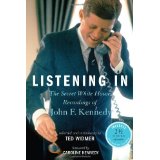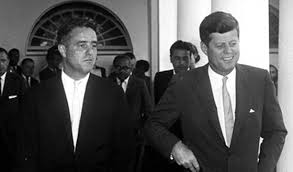Sarge Calls JFK About CIA Trying to Place Agents in the Peace Corps

In July 1962, in an effort to preserve an accurate record of Presidential decision-making in a highly charged atmosphere of conflicting viewpoints, strategies and tactics, John F. Kennedy installed hidden recording systems in the Oval Office and in the Cabinet Room. The result is a priceless historical archive comprising some 265 hours of taped material. JFK was elected president when Civil Rights tensions were near the boiling point, and Americans feared a nuclear war. Confronted with complex dilemmas necessitating swift and unprecedented action, President Kennedy engaged in intense discussion and debate with his cabinet members and other advisors.
Now, in conjunction with the fiftieth anniversary of the Kennedy presidency, the John F. Kennedy Library and historian Ted Widmer have carefully selected the most compelling and important of these remarkable recordings for release, fully restored and re-mastered onto two 75-minute CDs for the first time. Listening In represents a uniquely unscripted, insider account of a president and his cabinet grappling with the day-to-day business of the White House and guiding the nation through a hazardous era of uncertainty.

LISTENING IN
CALL FROM SARGENT SHRIVER, APRIL 2 , 1963
In this brief call, Peace Corps Director and President Kennedy’s brother-i n-law R. Sargent Shriver voices his concern that one of the President’s most idealistic proposals, the Peace Corps, is in danger of being subverted by the Central Intelligence Agency. Kennedy quickly understands the danger posed by this threat to one of his most valued forms of cultural diplomacy and promises to put a stop to it.
JFK: Hello.
SHRIVER: Hello, Jack?
JFK: Yeah, Sarge.
SHRIVER: Hi, how are you?
JFK: Good. Fine, fine.
SHRIVER: I’m sorry to bother you.
JFK: Not a bit.
SHRIVER: But I’m getting rather suspicious over here that, despite your instructions, that some of our friends over in the Central Intelligence Agency might think that they’re smarter than anybody else, and that they are trying to stick fellows into the Peace Corps.
JFK: Yeah, yeah.
SHRIVER: And John McCone has told me on two or three occasions, and Dulles of course did, that they never would do that.
JFK: Right, right.
SHRIVER: They sent out messages and the rest of it.
JFK: Right.
SHRIVER: But we’ve got a group in training now that looks suspicious, and I’d like to follow whatever you recommend, but I sure in hell want those guys . . .
JFK: Well, would you call Dick Helms?
SHRIVER: Dick Helms?
[Richard Helms (1913-2002) was deputy director of plans at the Central Intelligence Agency in 1963; he would ultimately serve as director of Central Intelligence (1966-1973).]
JFK: Yeah. He’s the operations officer over there, and just say to him that you’ve talked to me and that I don’t want anybody in there.
SHRIVER: OK.
JFK: And if they are there, let’s get them out now, before we have it. And if there is any problem about it, that Dick Helms ought to call the President about it. That . . .
SHRIVER: OK.
JFK: This is very, we are very, very anxious that there be no, we don’t want to discredit this whole idea.
SHRIVER: OK, fine.
JFK: And they, Christ, they’re not gonna find out that much intelligence!
SHRIVER: That’s right.
JFK: Now, the other thing is, I notice with these people coming back, can we do anything about seeing if we can get some of them to go into the Foreign Service?
SHRIVER: Yes. The Foreign Service has already changed their examination schedules, and the kind of exams they give, and the places that they are going to be given, and done everything that they think they can this year to facilitate Peace Corps guys getting into the Foreign Service, and . . .
JFK: Yeah.
SHRIVER: USIA has done the same thing, and AID is trying to do something.
JFK: Yeah. Yeah.
SHRIVER : I think we’ll have to find out by one trial run to see whether it’s successful.
JFK: OK. Well, I just wanted to be sure. Let me know if there’s anything we can do, but these are the guys I’d like to get into the Foreign Service.
SHRIVER: OK, fine.
JFK: OK.
SHRIVER: Thanks.
JFK: Bye, Sarge.
this sounds like a conversation that they knew was being recorded and wanted a record of opposition to CIA involvement in the Peace Corps. Like it was almost scrijpted. There were several conversations during our years, ’66-’68, in Ethiopia and many of us kind of took it forgranted that some of our colleagues were likely serving more than one master, and that volunteers would make excellent sources of intelligence on the ground. I’m just sayin’.
Fascinating. Nepotism has its benefits. Anyone know which training group Sarge was concerned about? David
We had a retired National Guard General at USAID in Somalia who blatantly tried to “buy” intelligence with beer and drinks from PCVs who came to Mogadishu from the bush. If there were already CIA plants among us, this would have been unnecessary. In addition, I know the US listening base, Kagnew Station at Asmara (then Ethiiopia, now Eritrea) was picking up all radio transmissions of the Somali Army and Police, so there was probably no need to bother too much infiltrating the PCVs.
I don’t think the JFK/Shriver call was scripted, not like Nixon saying “But that would be wrong.” Sounds like CIA trying to make an end run around a inexperienced President. More likely, Dulles and McCone said it officially to CIA Department Heads and winked and turned a blind eye to what happened.
Did the training/orientation for newly hired Country Directors and Deputies include instructions on avoiding contact with CIA and protecting Volunteers from the same?